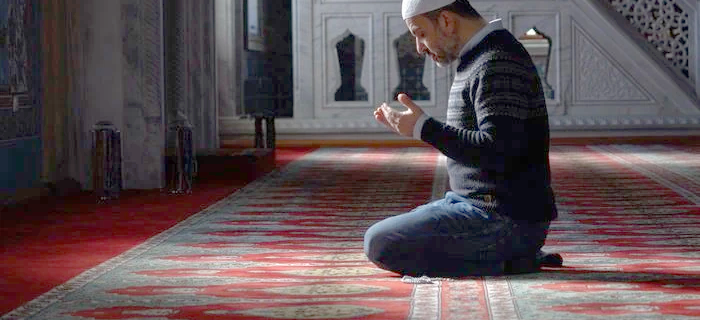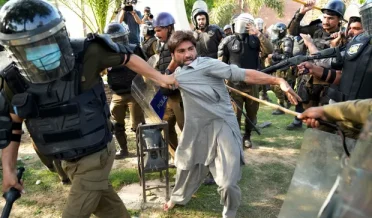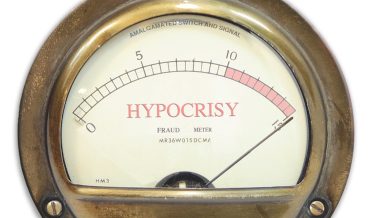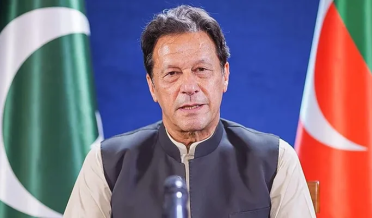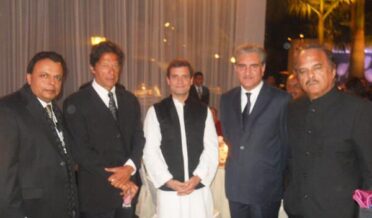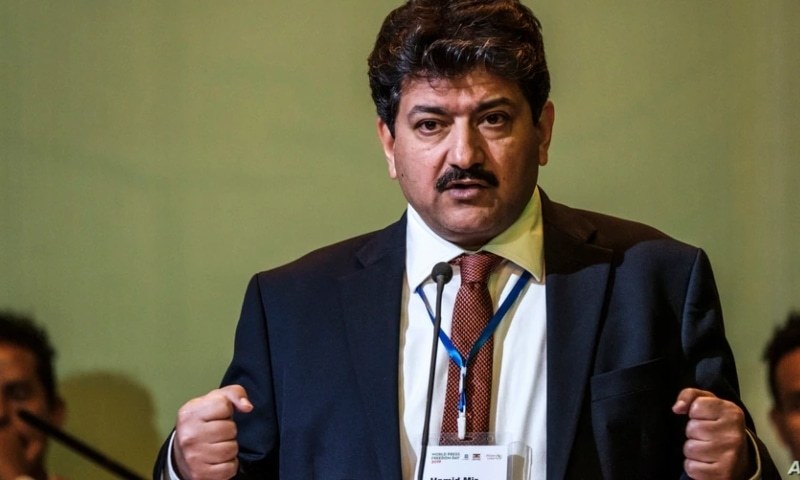
A political storm over the Islamophobic policies of India’s ruling party shows no signs of abating. The hateful remarks made by two officials of Narendra Modi’s BJP have enraged Muslims across the globe. Strategic rivals from Iran to Saudi Arabia are demanding a public apology from Modi himself. We have seen huge street rallies against hurtful remarks of two BJP leaders not only in India, Pakistan and Bangladesh but also all over the Muslim world.
Indian security forces have aggravated matters with a harsh crackdown. Police in the state of Jharkhand had fired on Muslim demonstrators, killing some people, including a 15-year-old student Mudassir Alam. His class 10th result was announced two weeks after his death and he passed with an A Grade. Authorities in parts of India have bulldozed the houses of Muslim Indians protesting against the blasphemous statements. All of this can be seen as the logical result of years of hate speech against Muslims.
Yet even if Modi apologises, that isn’t going to be enough to secure the future of Muslims in India. Nor is Islamophobia an India-specific issue. It is a global problem. A white supremacist killed 10 people in a supermarket in the US city of Buffalo on May 14, leaving behind a manifesto that also bristled with anti-Islamic sentiments (as well as anti-Semitic screeds). Muslims in Canada are still mourning the death of four people targeted for their religion in an attack in Ontario last year. Islamic believers are coping with manifestations of Islamophobia in places from Australia to Brazil.
I know that there are many people in the West who prefer to look away. Blasphemy, some say, is too sensitive a topic. Cracking down on religious hate speech would curtail freedom of expression.
But can we let it go like that? I don’t think so. Dutch lawmaker Geert Wilder had openly supported BJP leader Nupur Sharma for her hateful remarks. Wilder was convicted in the Netherlands for his hate speech in the past. His support for Nupur Sharma was seen as an alliance between anti-Islam elements in the West with Hindu nationalists in the East.
When the news about the protests against blasphemous statements of the two BJP officials broke, I was visiting the University of Oxford, UK. I took part in a debate in the famous Oxford Union about how laws dating back to the days of the British colonial period continue to shape South Asia today.
A portrait of former prime minister of Pakistan Benazir Bhutto is still hanging in the Oxford Union hall. She had presided over many debates in the same hall in the early 70s as the president of Oxford Union.
In her last book “Reconciliation” (published in 2008), she had criticised some American writers like Robert Spencer, who were creating misunderstandings between the east and the west by spreading disinformation about Islam. She had always supported a dialogue to resolve all problems.
I was doing the same in the Oxford Union hall and tried to gather support through arguments. I criticised the British colonial laws like sedition (124 A) introduced to the Subcontinent in 1860 and demanded abolition of colonial legacy. Many Indian speakers supported my stance. Finally, the house passed the resolution that “British Raj still lives on”.
After the debate, a young female student from Bangladesh asked me about Pakistan’s anti-blasphemy law: “Don’t you think that this colonial law should also be abolished?” I explained to her the background of blasphemy laws in Pakistan. I told her that there is no doubt that the blasphemy laws in Pakistan have been misused for the purposes of censorship. I have same experienced it myself. Many state and non-state actors in Pakistan had used blasphemy charges against me, my TV channel and many other journalists just to silence the voices of dissent.
Yet blasphemy – which can be seen as a particularly toxic expression of the broader problem of Islamophobia – is an extremely sensitive issue, and we should treat it very carefully. During my visit to the UK, I met several Muslim members of the British parliament as well as other representatives of the Muslim community. All of them expressed concern about the growing radicalisation of young British Muslims – a process driven, they said, by a rising tide of Islamophobia (sometimes expressed in the form of offensive comments about Islam). Studies have shown that permissiveness about blasphemy can incite violence.
This is one reason why Muslim countries have spent the past decade calling for a global anti-blasphemy mechanism. Blasphemy in the west or anti-Islam actions of Hindu nationalists has always provided strength to extremist forces in Muslim countries who want to push us towards a third world war.
By stirring up passions across the Muslim world, the latest blasphemy incident in India has strengthened the extremist forces who blame the west for Islamophobia. If western societies simply ignore the problem, it will continue to fester. I fear a new storm of extremism if the trend is not addressed.
There is a way forward. Earlier this year, the UN General Assembly had passed a landmark unanimous resolution designating March 15 as the “International Day to Combat Islamophobia.” There was a specific rationale for the choice of date. On that day in 2019, a right-wing extremist had killed over 50 Muslims in New Zealand. The resolution was presented by Pakistan on behalf of the Organisation of Islamic Cooperation.
Pakistani leaders Asif Ali Zardari, Shahid Khaqan Abbasi and Imran Khan had repeatedly raised their voices against blasphemy and Islamophobia in the UNGA in their speeches of 2012, 2017 and 2021. Pakistan had introduced its first resolution condemning religious defamation in the United Nations Human Rights Council in 2009.
Some will say that such well-intentioned gestures mean little. I respectfully disagree. The UN-sponsored mechanisms can serve a useful purpose. An international consensus to treat blasphemy as a hate crime can help minimise misunderstandings among civilisations and religions. The UN-approved standards can offer important guidelines to countries that are trying to formulate laws of their own. A few days back, June 18 was commemorated as the International Day to counter Hate Speech by the United Nations. The UN Action Plan against Hate Speech is an effort to counter hatred without creating threats for freedom of speech.
But the world should do more. The international community needs to articulate a new set of principles – a code of behaviour, if you will – condemning violence and discrimination against people of all religions or beliefs, including Muslims. It would call for a global dialogue on the promotion of a culture of tolerance and peace, based on respect for human rights and the diversity of religions and beliefs.
A good model for such an approach already exists. It’s called the Istanbul Process. In 2011, the UN Human Rights Council had passed a resolution that led to an ongoing discussion between Muslim nations and the US, the UK and the countries of the European Union. The countries have been discussing ways to identify tensions to combat the root causes of religious discrimination and criminalise incitement to violence.
I think Pakistan and the other 56 members of the Organisation of Islamic Cooperation should follow the Istanbul Process to create a permanent mechanism against discrimination and blasphemy addressed to all religions.
If Muslims want others to respect their Prophet (SAW), they can start it by following his teachings. The Prophet (SAW) preached tolerance. He asked Muslims to respect other religions. He once allowed a Christian delegation, including a bishop, to pray inside a mosque.
A few days back, some people had attacked a Hindu temple in Karachi, claiming that they were retaliating against the blasphemous statements from India. This attack was a violation of Islamic teachings. Muslim leaders should condemn these attacks against temples and churches very loudly. Muslim majority nations must protect the rights of non-Muslims. They must emerge as a new role model for the protection of human rights under Islam. Respect cannot be demanded by force. It has to be earned by spreading the true message of Islam.
Most importantly, any new code of conduct against blasphemy should not be used to restrict freedom of speech. The OIC can start by addressing worries about the misuse of blasphemy laws. These concerns are not limited to Muslim countries, by the way: A Pew Research Center study in 2019 had found that one out of four countries in the world maintained laws against blasphemy or apostasy.
There is no question that finding the right balance will be a challenge. But the fundamental problem must be tackled. One problem is that western countries have been repealing blasphemy laws even while Muslim countries have been demanding action from the UN on blasphemy. They are going in the opposite direction. This is profoundly dangerous. We must avoid a clash of civilisations. We need a dialogue. The late Benazir Bhutto had proposed an honest dialogue to avoid clash of civilisations. She had concluded her last book by saying “It is time for new ideas. It is time for creativity. It is time for bold commitment. And it is time for honesty, both among people and between people.”

